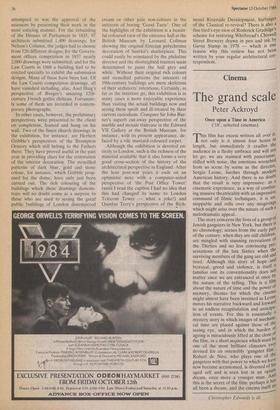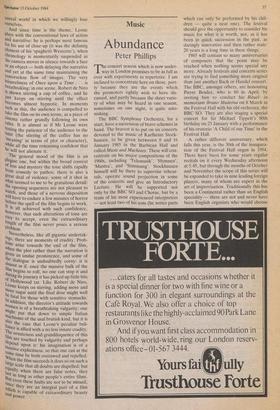Cinema
The grand scale
Peter Ackroyd
Once upon a Time in America (`18', selected cinemas) This film has excess written all over it: not only is it almost four hours In length, but immediately it cradles the audience in a fleshy embrace and will not let go; we are stunned with panoramas: stifled with noise, the emotions wrenchen from us scene by scene as the director, Sergio Leone, lurches through modern American history. And there is no doubt that the result is very impressive: as, a cinematic experience, as a way of combin- ing massive theatricality with an impressive command of filmic techniques, it is stoppable and and rolls over any misgivings which might arise over the nature of such a melodramatic appeal. The story concerns the lives of a group 0.f Jewish gangsters in New York, but there Is no chronology; scenes from the early Part of the century, when they are still children, are mingled with stunning recreations nf the Thirties and no less convincing Pre- sentations of the late Sixties when the surviving members of the gang are old an° tired. Although this story of hope and betrayal, greed and violence, is itself a familiar one its conventionality does nnt matter since we are entranced at once,hY the nature of the telling. This is a flint, about the nature of time and the power 0' memory, themes for which the cinema might almost have been invented as Leone moves his narrative backward and forward in an endless recapitulation and anticipa' tion of events. For this is essentially a mystery story in which images of mecharn- cal time are placed against those of thef seeing eye, and in which the burden ageing is miraculously lifted at the close ot the film, in a short sequence which must be one of the most brilliant climaxes eve! devised for an ostensibly 'gangster Mal ' Robert de Niro, who plays one of the gangsters with that power to which we ha".0 now become accustomed, is divested of Ins aged self and is seen lost in an opil dream, once more a younger man. An this is the secret of the film: perhaps it has all been a dream, and the cinema itself an
unreal world in which we willingly lose ourselves.
And since time is the theme, Leone Plays with the conventional laws of action and narrative: he is perhaps most famous for his use of close-up (it was the defining element of his 'spaghetti Westerns'), when Chronology is momentarily suspended as the camera moves in silence towards a face or an object — both delaying the narrative and yet at the same time maintaining the remorseless flow of images. The very leisureliness of Once upon a Time. . . is breathtaking; in one scene, Robert de Niro is shown stirring a cup of coffee, and he just keeps on stirring until the effect becomes almost hypnotic. In moments such as this, the audience is compelled to take the film on its own terms, as a piece of Cinema rather grandly following its own rules. It is almost as if Mr Leone were testing the patience of the audience to the 14114 (the stirring of the coffee has no 'Meaning' in terms of plot or character), While all the time remaining confident that he will not alienate it.
The general mood of the film is an glegiac one, but within the broad context of loss and mystery the tone shifts rapidly hem comedy to pathos; there is also a great deal of violence, some of it shot in what seemed to me to be gratuitous detail: the opening sequences are not pleasant to Watch, and those of a nervous disposition Will have to endure a few minutes of horror ,Defore the spell of the film begins to work. L't is all achieved with such confidence, nowever, that such alterations of tone are easy to accept, even the extraordinary 'ength of the film never poses a serious Problem.
. Nevertheless, like all gigantic undertak- !ags, there are moments of crudity. Prob- lems arise towards the end of the film, when the plot rather than the narration is ven an undue prominence, and some of lrie dialogue is undoubtedly corny: it is apinlost as if, once the massive bulk of the ,`11111 begins to roll, no one can stop it and `T ring its journey it has picked up little bits (131 Hollywood tat. Like Robert de Niro, Leone keeps on stirring, adding more and rrnore sugar until the final dose might well ,ne fatal for those with sensitive stomachs. 'n addition, the director's attitude towards women is of a breathtaking vulgarity; one 'night put that down to simple Italian 11,1,achismo of the usal brutish kind, but it is 50 the case that Leone's peculiar bril- 4!nee is allied with a no less innate crudity. ,..`,ne ornateness and grandiloquence of this Allint are touched by vulgarity and perhaps ePend upon it: his imagination is of a _massive explicitness, so that one can at the ne time be both overawed and repelled. 7hen the film succeeds it does so on such a ...4trge scale that all doubts are dispelled; but atItially when there are false notes, they st as long as other people's entire films. 'pit even these faults are not to be missed, ,..Ina_c.e they are an integral part of a film 'web is capable of extraordinary beauty and Power.























































 Previous page
Previous page